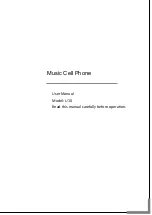
12
Your safety guidelines
Please read and understand the following safety guidelines before
you use the phone. These guidelines provide details to enable you
to operate your phone safely and conform to any legal requirements
regarding the use of cellular phones.
Do not to use the phone at
a refuelling point. Observe
restrictions when using
radio equipment at fuel depots,
chemical plants or where blasting
operations are in progress.
Electrical interference may
obstruct the use of your phone.
Switch off your cellular phone
when in an aircraft. Wireless
phones can cause interference
or danger to an aircraft.
Do not expose the battery to
high temperatures (in excess
of 60
O
C).
The symbol of the crossed-out
wheeled bin indicates that within
the countries in the European
Union, this product, and any
enhancements marked with this
symbol, can not be disposed
as unsorted waste but must be
taken to separate collection at
their end-of-life.
Ensure that only qualified
personnel install or repair your
phone.
Adhere to road safety laws. Do
not hold/use a phone while you
are driving; find a safe place to stop
first. Do not speak into a hands-free
microphone while you are driving.
Observe restrictions in hospitals and
near medical equipment.
Avoid using the phone in close
proximity to personal medical
devices, such as pacemakers and
hearing aids.
Use only JCB™ TOUGH-
PHONE™ approved charging
equipment to charge your phone
and avoid damage to your phone.
The JCB™ TOUGHPHONE™ is
water-resistant, dust-resistant and
rugged. However, it is not water-
proof, dust-proof or incapable of
being broken if dropped or thrown.
For best results one should protect
the TOUGHPHONE™ from
moisture, dust and strong impacts.
Make back-up copies of important
information stored in your phone or
maintain a written record.













































